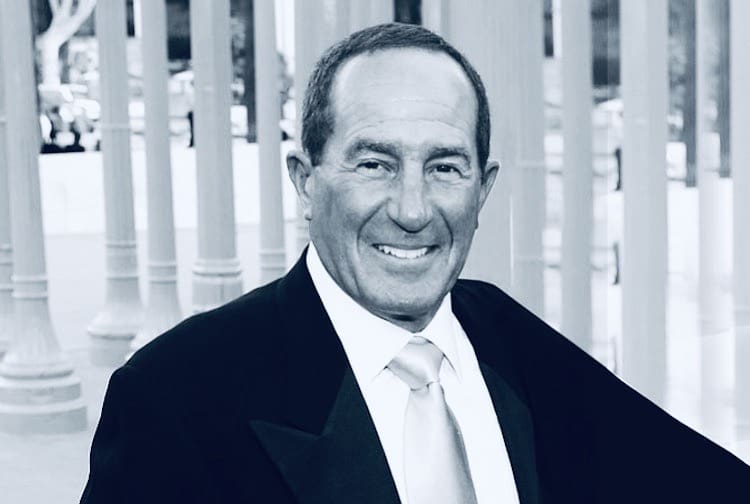A few years ago, billionaire Geoffrey Palmer was crowned with an ignominious title: “Downtown L.A.’s worst developer.” It was easy to understand why. From building apartment complexes next to polluting freeways to getting sued for allegedly keeping millions of dollars in rental security deposits, Palmer has a horrible reputation. He also spent millions to stop rent control while Californians struggle through a worsening housing affordability crisis. But that doesn’t bother him much — Palmer just wants to keep making enormous profits.
Palmer, who praises himself as a “true visionary,” owns or manages more than 11,000 apartments in Southern California. He’s one of the largest luxury-housing developers and landlords in California, which has turned him into a billionaire. While millions of Californians worry about how to pay the rent, he lives a life of extravagance at palatial, multi-million-dollar estates in Beverly Hills, Malibu, and Aspen, Colorado. His Tudor-style mansion in Beverly Hills is estimated to be worth $16.3 million.
That’s where Palmer held a big bash for Donald Trump in 2019, hosting a fundraiser that probably raked in millions — a minimum donation to attend the soirée was $1,000 for an individual dinner seat and $100,000 per couple. Geoffrey Palmer, in fact, has long been an ardent supporter of Trump’s. Since 2016, he’s shelled out a whopping $14.8 million to campaign or political action committees that back Trump, according to FEC filings.
Sometimes Palmer’s campaign contributions haven’t always been on the up and up. Politico reported that, in 1991, the “California State Fair Political Practices Commission charged Palmer with 15 counts of illegally laundering campaign contributions to try to prevent Santa Clarita from incorporating, after an anonymous tip hinted that Palmer had encouraged employees of his company to donate to a PAC opposed to the incorporation and had reimbursed those employees with both company and personal funds. Palmer and his company ended up paying $30,000 in fines for the violations.”
All that cash to buy mansions and curry favor from Trump came from Palmer’s nefarious business methods.
Palmer specializes in building luxury-housing complexes next to busy freeways — the kind of housing that’s been nicknamed “black-lung lofts.” For years, USC researchers and a host of other experts have shown that housing near freeways seriously jeopardizes the health of children, pregnant women, the infirm, and seniors. Palmer, apparently, doesn’t care — at all.
In 2007, through a lawsuit, Palmer was successful in overturning L.A.’s zoning requirements for including affordable housing in new developments — known as “inclusionary housing.” Housing activists hold up inclusionary housing as a key tool to ensure that luxury-housing developers build affordable housing during California’s housing affordability crisis. Once again, Palmer didn’t care — he just wanted to make maximum profits no matter the consequences for everyone else.
In 2019, Palmer was hit with a class-action lawsuit that charged him with wrongly keeping millions of dollars in rental security deposits from thousands of tenants in Southern California.
San Diego attorney Jimmie Davis Parker said that Palmer, “through his company systematically and in bad faith, retained security deposits by failing to properly document the work that they charge tenants for when they move out.”
The lawyer added that unlike Geoffrey Palmer, “Most people who rent apartments are not wealthy individuals and they often times rely upon the return of their security deposit to help with the expense of moving locations.”
In 2018, Palmer contributed $2 million to stop Proposition 10, the statewide ballot measure that would have expanded rent control in California. Palmer’s cash helped Prop 10 opponents pay for a massive, and deceitful, TV ad campaign that tricked and confused voters. Prop 10 lost at the polls, despite the endorsements of more than 525 social and housing justice organizations, civic leaders, and elected leaders.
Palmer will undoubtedly join other billionaire landlords, such as Equity Residential founder Sam Zell, and shell out major cash to stop the Rental Affordability Act. Now known as Proposition 21, the November ballot measure again seeks to expand rent control in California. Activists argue that with mass unemployment and lost wages triggered by the COVID-19 pandemic, California’s 17 million renters need rent control more than ever. Geoffrey Palmer probably won’t care one iota. His track record shows he’s only out for myself — no matter who gets hurt.

